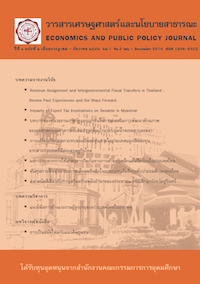Impacts of Export Tax Implications on Sesame in Myanmar
Main Article Content
บทคัดย่อ
Export tax as a price control has been imposed on agricultural products of Myanmar. Sesame, one of the high potential export commodities from Myanmar, is also distorted by government export tax policy to shrink the volume of trade. This study investigates the impacts of imposing export tax on sesame seed trade under the assumption of dominant exporting country. To understand the closely related market nature, sesame market structure is estimated using simultaneous equations. Partial equilibrium view of policy simulation is further examined for clarification of alternative policy impacts (10%, 8%, and 5% export tax) on market participants. Simulation results report that current export tax causes the consumer surplus in both direct consumption and crushing sectors. A part from this it shows the best results not only in government revenue but also in society surplus. The recommendation can therefore be drawn out of this study that the export volume should not totally be banned and the export tax should not be totally eliminated for this commodity. Moreover, the tax revenue should be used in sesame industry improvement.
Article Details
ประเภทบทความ
บทความวิจัย
สงวนลิขสิทธิ์ © 2553 คณะเศรษฐศาสตร์ มหาวิทยาลัยศรีนครินทรวิโรฒ
คณะเศรษฐศาสตร์ มหาวิทยาลัยศรีนครินทรวิโรฒ จัดพิมพ์วารสารเศรษฐศาสตร์และนโยบายสาธารณะ เพื่อเผยแพร่บทความวิชาการทางเศรษฐศาสตร์ นโยบายสารธารณะ และสาขาอื่นๆที่เกี่ยวข้อง ทัศนะและข้อคิดเห็นใดๆ ที่ปรากฏในวารสารเป็นความคิดเห็นส่วนตัวของผู้เขียน โดยบทความที่ได้รับการตอบรับจะถือเป็นลิขสิทธิ์ของคณะเศรษฐศาสตร์ มหาวิทยาลัยศรีนครินทรวิโรฒ
บรรณาธิการ อาจารย์ ดร.พลพัธน์ โคตรจรัส


